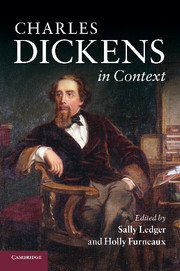Book contents
- Frontmatter
- Contents
- List of illustrations
- Notes on contributors
- Preface
- Notes on references
- PART I LIFE AND AFTERLIFE
- PART II SOCIAL AND CULTURAL CONTEXTS
- 12 Popular culture
- 13 The rise of celebrity culture
- 14 The newspaper and periodical market
- 15 Authorship and the professional writer
- 16 The theatre
- 17 Melodrama
- 18 The Bildungsroman
- 19 Visual culture
- 20 The historical novel
- 21 The illustrated novel
- 22 Christmas
- 23 Childhood
- 24 Work
- 25 Europe
- 26 The Victorians and America
- 27 Educating the Victorians
- 28 London
- 29 Politics
- 30 Political economy
- 31 The aristocracy
- 32 The middle classes
- 33 Urban migration and mobility
- 34 Financial markets and the banking system
- 35 Empires and colonies
- 36 Race
- 37 Crime
- 38 The law
- 39 Religion
- 40 Science
- 41 Transport
- 42 Illness, disease and social hygiene
- 43 Domesticity
- 44 Sexuality
- 45 Gender identities
- Further reading
- Index
15 - Authorship and the professional writer
Published online by Cambridge University Press: 05 August 2012
- Frontmatter
- Contents
- List of illustrations
- Notes on contributors
- Preface
- Notes on references
- PART I LIFE AND AFTERLIFE
- PART II SOCIAL AND CULTURAL CONTEXTS
- 12 Popular culture
- 13 The rise of celebrity culture
- 14 The newspaper and periodical market
- 15 Authorship and the professional writer
- 16 The theatre
- 17 Melodrama
- 18 The Bildungsroman
- 19 Visual culture
- 20 The historical novel
- 21 The illustrated novel
- 22 Christmas
- 23 Childhood
- 24 Work
- 25 Europe
- 26 The Victorians and America
- 27 Educating the Victorians
- 28 London
- 29 Politics
- 30 Political economy
- 31 The aristocracy
- 32 The middle classes
- 33 Urban migration and mobility
- 34 Financial markets and the banking system
- 35 Empires and colonies
- 36 Race
- 37 Crime
- 38 The law
- 39 Religion
- 40 Science
- 41 Transport
- 42 Illness, disease and social hygiene
- 43 Domesticity
- 44 Sexuality
- 45 Gender identities
- Further reading
- Index
Summary
Among Dickens's many social projects, his ambition to reform the literary marketplace was one of the most determined and persistent. In a letter to Thackeray, written in January 1848, he declared that he was ‘always possessed with the hope of leaving the position of literary men in England, something better and more independent than [he had] found it’. At this stage of his career he had achieved, largely due to the prodigious success of Dombey and Son, financial security and enduring international fame. He was, however, mindful of the fact that ‘literature as a profession has no distinct status in England’. To Dickens, a man haunted by insecurities and anxieties concerning his own status, this was an unbearable situation: he was known around the world for his writings, yet in his own country writers were not recognised as professionals, let alone as gentlemen. To resolve this dilemma, Dickens set out on a campaign to change the ideological and material conditions of authorship.
Dickens had much to gain from a reform of the literary marketplace, especially in the early years of his career when his campaigns for international copyright were aimed at increasing his earnings significantly, especially from book sales in America. In later years, when his focus was on establishing literature as a profession, he set himself up to become its leader and champion. It would be wrong, however, to assume that he was acting solely in his own interest when he promoted authorship.
- Type
- Chapter
- Information
- Charles Dickens in Context , pp. 117 - 124Publisher: Cambridge University PressPrint publication year: 2011



